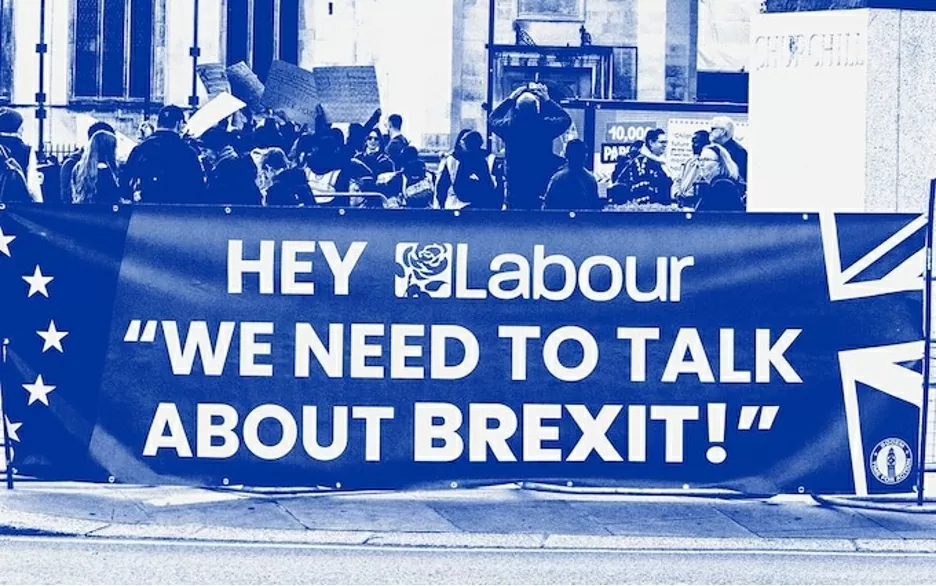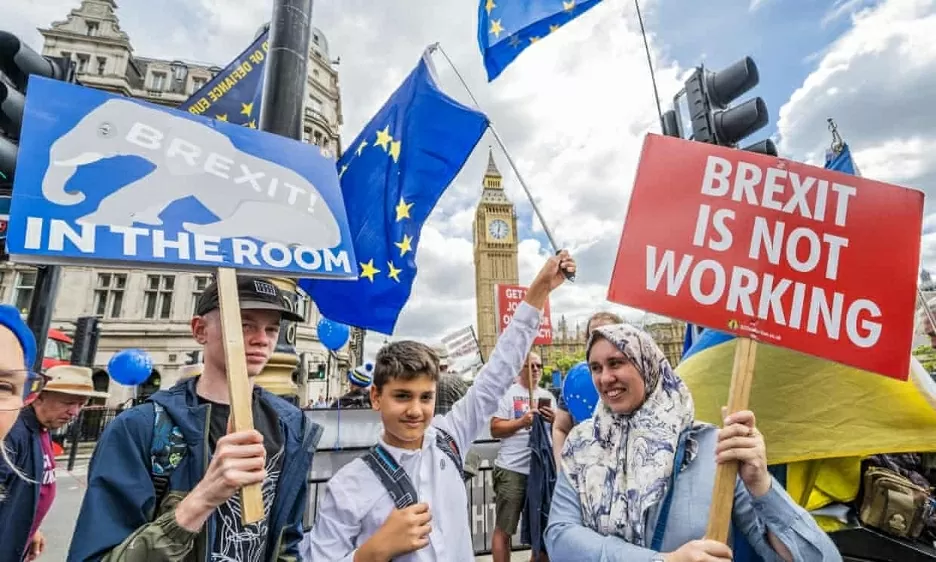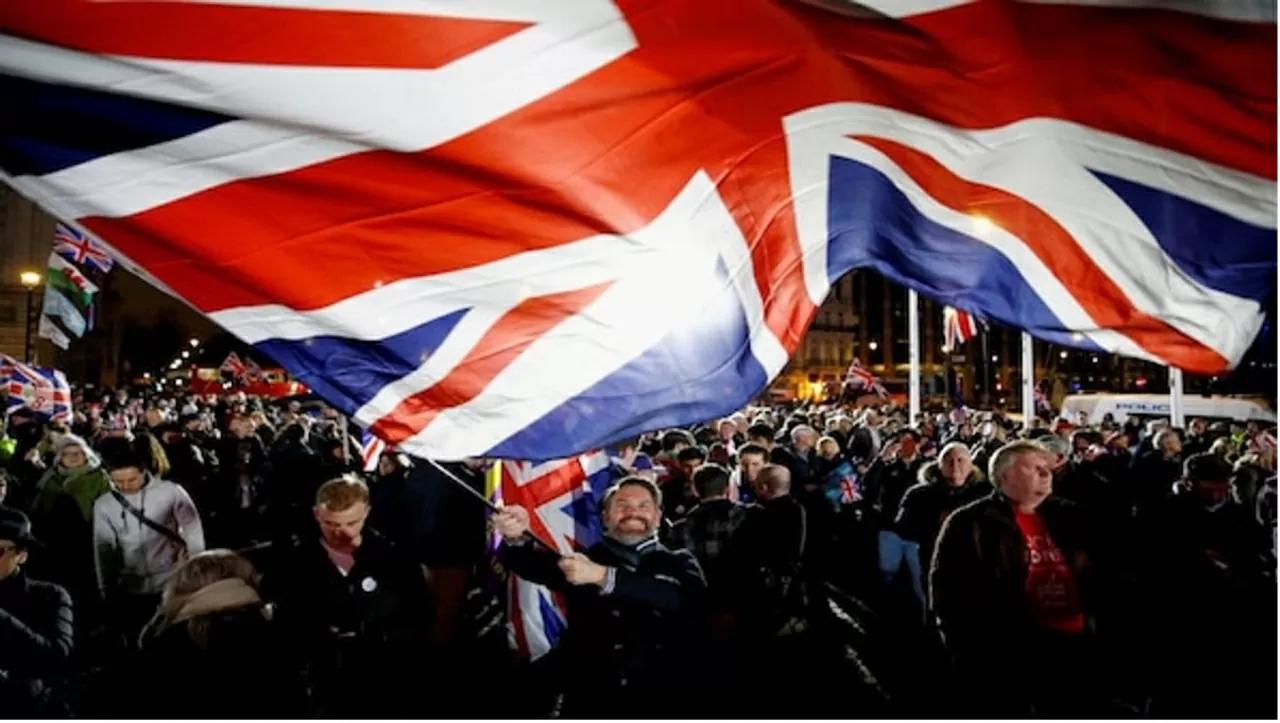So it has been 5 years since the UK left the European Union (EU) at 11pm on January 31, 2020.
|
Exactly five years ago, two crowds of contrasting moods gathered near the British Parliament —one jubilantly waving the Union Jack, the other tearfully waving the EU flag.
At 11pm on January 31, 2020 (London time), or midnight at the EU headquarters in Brussels, the UK officially left the bloc after nearly 50 years of membership. This decision ended a period of free movement and trade between the UK and 27 other European countries.
For Brexit supporters, Britain is now a sovereign nation, completely in control of its own destiny. But for opponents, the country has become isolated and weakened.
There is no denying that Britain was deeply divided and embarking on a precarious journey. Five years on, people and businesses are still grappling with the economic , social and cultural aftershocks of Brexit.
“The implications of Brexit are really far-reaching,” said political science professor Anand Menon, director of the Britain in a Changing Europe think tank.
“It has changed our economy. It has fundamentally changed our politics,” he said, adding: “We have seen a new polarisation around Brexit, which is now part of electoral politics.”
From surprise vote to thorny journey
As a country with deep pride in its history, Britain has never been truly comfortable in its role as an EU member, according to an analysis in an ABC News article.
When the country held a referendum in June 2016 on whether to stay or leave the bloc, the socio-economic context set the stage for a wave of support for Brexit.
Decades of deindustrialisation, coupled with public spending cuts and high levels of immigration, have made the argument that Brexit will help Britain “take back control” of its borders, laws and economy more appealing than ever.
But the result of 52% in favour of leaving the EU and 48% in favour of remaining was still shocking. Neither the Conservative government, which campaigned to keep Britain in the EU, nor the Brexiteers had a concrete plan for a complicated divorce.
The referendum was followed by years of bitter debate over the terms of the divorce between a wounded EU and a divided Britain.
The deadlock in Parliament eventually led to the downfall of Prime Minister Theresa May, who resigned in 2019, making way for Boris Johnson, who pledged to “get Brexit done”.
But things are not that simple.
 |
| January 31 marks five years since Britain officially left the European Union (EU). (Source: Telegraph) |
Businesses struggle in the face of many difficulties
Britain left the EU without a deal on future economic relations with the bloc, which accounts for half of its trade.
After formally leaving, London and Brussels entered into 11 months of intense negotiations, finally reaching a deal on Christmas Eve 2020.
The minimal trade deal allows goods between the two sides to flow without tariffs or quotas, but it entails a host of red tape, high costs and delays in trade.
“We cost more, we operate more slowly, and we are definitely more expensive. But we are still alive,” said Lars Andersen, owner of My Nametags, a London-based company that exports labels for children’s clothing and school supplies to more than 150 countries.
To maintain business with the EU, Mr. Andersen was forced to open a facility in Ireland, which receives all orders from the UK before shipping them to European countries.
He said the inconvenience was still worth keeping in business, but many small businesses he knew had had to stop trading with the EU or move production outside the UK.
Julianne Ponan, founder and CEO of allergen-free food company Creative Nature, once had a thriving export market in the EU but has been hit hard by Brexit.
However, she quickly turned to the Middle East and Australia, which she sees as a rare post-Brexit bright spot.
After adjusting to the new complexities, Ponan is slowly resuming operations in Europe. “However, we lost four years of growth there,” she said. “That’s the biggest regret. If Brexit hadn’t happened, we would have been much further along.”
Long-term consequences, heavy trade losses
The UK government's Office for Budget Responsibility predicts that in the long term, the country's import and export turnover will be around 15% lower than if the UK had remained in the EU. Economic productivity is also forecast to be 4% lower than it would have been.
Brexit supporters argue that short-term hardship will be offset by the freedom to strike trade deals with global partners.
Since leaving the EU, Britain has struck trade deals with Australia, New Zealand and Canada.
However, trade expert David Henig, of the European Centre for International Political Economy, said these deals would not make up for the loss of trade with Britain's close neighbours.
“The big companies are not affected much,” Henig added. “We still have Airbus, we still have the Scotch whisky industry, we still have the defence sector and the big pharmaceuticals. But the mid-sized companies are struggling to maintain their export position. And there are no new companies coming in.”
 |
| Many people wonder what benefits Brexit has brought to the UK? Illustration photo. (Source: The Guardian) |
Not as expected, but there is no way back
In many respects, Brexit has not turned out as both its proponents and opponents had envisioned. The Covid-19 pandemic and the Russia-Ukraine conflict have added economic disruption, making the true impact of Britain’s departure from the EU harder to gauge.
Notably, on the issue of immigration, Brexit has had the opposite effect than many expected. One of the reasons voters chose to leave the EU was the desire to control immigration more tightly.
But immigration to the UK is now even higher than before Brexit, as the government issues more visas to workers from around the world.
At the same time, the rise of protectionism, especially with the return of US President Donald Trump, has left Britain in a difficult position between two options: maintaining close relations with its European neighbors or strengthening the transatlantic "special relationship" with the US.
“The world is much less tolerant now than it was in 2016, when we voted to leave the EU,” said Professor Anand Menon.
Polls show that a growing number of Britons believe Brexit was a mistake. But the chances of reversing the decision remain remote. Memories of controversy and division are still fresh, and no one wants a repeat.
British Prime Minister Keir Starmer, who won the July 2024 election, pledged to “reset” relations with the EU but ruled out rejoining the customs union or single market.
He aims to make more modest adjustments, such as making it easier for artists to tour, recognizing professional qualifications between the two sides and increasing cooperation in law enforcement and security.
EU leaders welcome the change in attitude from Britain, but they also face internal challenges from a rising populist wave.
“I totally understand that, it’s hard to come back from a tumultuous divorce,” said businessman Lars Andersen, but he still hopes that the UK and the EU will gradually move closer together in a natural and less noisy way.
“I think it will happen, but it will happen slowly and subtly, rather than being publicly announced by politicians,” he shared hopefully.
Source: https://baoquocte.vn/5-nam-hau-brexit-cuoc-ly-hon-day-song-gio-voi-eu-nuoc-anh-da-thay-doi-ra-sao-302770.html




































































































Comment (0)